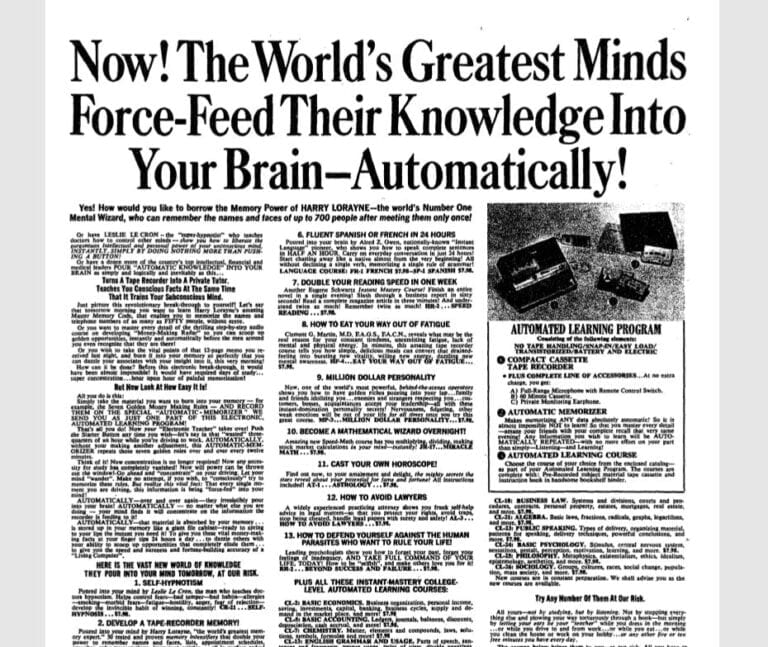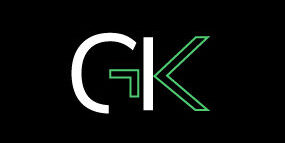What happens when you try to sell miracle cures? Simple. You get sued.
“But wait, George. Isn’t copywriting about saying you’re the Best-est?
Because that’s what Bob the Manager wants, we must copy those competitors… and we must sound BIGGER and BETTER.
What’s more, Jenny B-School gave us copywriting formulas. They start with “Top 5…”, “The Secret Of…”, “Little Knows Ways To…” (…and end with “boring.”)
Truth: The more bullshit a product is, the more direct response copywriting techniques are needed in order to manipulate people into buying it.
That’s a cold, hard, clinical fact.
Quelle tragédie!
Because there’s an entire ecosystem of course-sellers and seminar speakers that peddle direct response copywriting as a most exciting, universally accessible, surpassingly lucrative…
… weapons-grade persuasion superpower that’s basically the “keys to the marketing kingdom”…
… without ever mentioning that the companies that pay big bucks for direct response copywriting tend to have sketchy, misleading, if not outright scammy products.
Don’t believe me? Read on and learn.
Learn how “NewMarket Health Publishing,” a division of the famous, billion-dollar Agora Financial company, used “dark side copy secrets” to scam diabetic American seniors… until the Federal Trade Commission decided to sue them.
Just the facts.
(You can get the full details here. Everything you read below is my interpretation.)
So why did the FTC sue Agora?
Because since at least December 2018 (and continuing to the time of the complaint), they were advertising, promoting, and offering for sale an interesting collection of 11 pamphlets (totaling under 100 pages) known as “The Doctor’s Guide to Reversing Diabetes in 28 Days.”
They claimed that this simple, doctor-guided, scientifically proven protocol could permanently cure type 2 diabetes (in 28 days!) without requiring dietary changes and exercise.
Here’s a snippet of what they claimed on an email:
“[…] Let me repeat: This brand-new treatment will reverse your diabetes just four weeks from today. Without changing your diet, spending a minute in the gym, or taking a single drug.”
On the header of their video sales presentation page, they claimed:
“Shocking study shows a 100% cure rate. Stay on this page for details.”
And of course, the sales page came complete with an exit-intent popup that urged the viewer to…
“Wait! By clicking out of this page, you’ll forfeit the chance to learn about this powerful solution for your health. Click Watch Video to continue watching. Or click Read Transcript to read about this solution instead.”
As is common in health-related presentations targeting seniors, there were also mentions of “ineffective/wrong” mainstream treatment methods…
… easy 3-step healing protocols…
… reversing disease rather than masking its symptoms…
… but the real kicker was the absurd claim that Type II diabetes is caused by exposure to everyday electronic devices like computers and cell phones.
(… facepalm)
Dark Side Marketing Is Not Sustainable.
Let’s be frank.
“The Doctor’s Guide” was a con. To put into perspective how much of a con it was, consider that the FTC sued Agora.
This means that the FTC received such an alarming number of customer complaints that they were left no choice but to intervene.
Now, if we do keep in mind that Agora has a TON of customer service people to put out fires…
And that out of every hundred disappointed customers, maybe one would bother to file a complaint to the FTC…
Then it’s crystal clear that “The Doctor’s Guide” scam sold like gangbusters.
Yet, what’s the point of making money if you’re going to get sued?
Because don’t get me wrong, I want to be clear here. I’m NOT judging Agora from some high horse. In the context of this post, I don’t care about their morals (or lack thereof).
The reason why I am featuring Agora Financial in my Dumb Marketing Series is that they demonstrated a sharp lack of business sense.
Want to check more Dumb Marketing examples to avoid?
Check out my piece on Burger King’s AI-themed campaign (eyeroll), spiced up with Dilly Dilly silliness and the Mother of All Advertising Facepalms: Nissan, 1996.
Simply put, their way of marketing and promotion is no longer sustainable.
Specifically, that’s because they failed to adapt their “information business” model to the modern world.
In other words – and I’m going to explain precisely why right below – Agora Financial got lazy.
A brief advertising history lesson.
Hundreds of years ago, back when advertising costs were through the roof (and you had to lick a buttload of envelopes to mail an advertisement)…
A bunch of sharp, direct marketers realized that people buy what they want, not necessarily what they need.
Unsurprisingly, these direct marketers started mailing ads that promised what consumers wanted to hear.
Here’s an example.

Notice how the copywriter didn’t say that you ought to painstakingly study the educational tapes being sold.
Instead, the copywriter wrote: “Now! The World’s Greatest Minds Force-Feed Their Knowledge Into Your Brain – Automatically!“
Does this look like standard, awful Buzzfeed clickbait to you?
Maybe. But can you imagine how powerful this kind of advertising was back when consumers received a fraction of the advertising bombardment they receive today?
When marketers hadn’t yet used the internet to spam consumers to the point of ad blindness?
Back then, this type of copywriting was incredibly powerful.
In fact, it was so incredibly powerful that when advertising online became a real thing, these ads were endlessly “swiped,” stolen, flat-out copied, tweaked, and Frankenstein’d together, well beyond the point of sanity and reason.
Which is exactly why companies like Agora Financial now face huge problems.
Let me explain.
There’s this relatively well-known (but awfully misunderstood) advertising concept called the “unique selling proposition,” otherwise known as USP.
In short, a USP is a) something your target customers want b) something your competitors don’t do, or don’t have, or haven’t yet said and c) something that you can do, or do have, or can say.
The issue with companies like Agora is that their entire USP is their copywriting – in other words, they differentiate their products through ideas alone.
They “invent” USPs, the way legendary copywriters like Eugene Schwartz used to do.
The difference is that back at Schwartz’s time, advertising was scarce, less controlled, and by extension, astronomically easier to believe…
… whereas now consumers are bombarded by an incredible 4.000 to 10.000 ads per day on average.
So, what do companies like Agora Financial do?
Instead of investing their resources on developing better, trustworthy products, they invest everything they have in finding new new “Big Ideas,” and new “unique mechanisms”…
… to increase the perceived value of mediocre, “afterthought” products…
… and consequently allowing (inviting) competitors to start “out-hyping,” “out-bragging,” and eventually (yes!) “out-lying” them.
A never-ending downward spiral that forces them, their competitors, and the entire “information business” direct marketing ecosystem…
Dangerously close to con territory.
Which is precisely how fraud products like “The Doctors Guide” get made.
Because when your only differentiating factor, your only innovation, your only competitive advantage is your ability to concoct persuasive marketing claims…
Your hard is forced. Your hand is forced because you face huge, intractable problems like the following:
- Competitors can and will copy you.
- Competitors can and will lie to outperform you.
- You can and will be forced to say (or do) morally gray things to stay in business.
- Many customers can and will shun you because you did not deliver on your promises.
- Advertising platforms will stop you from scaling your business after a certain point.
Or, you know.
You might even get sued by the FTC.
If you are a direct marketer, you’ve been warned.
Can you be an effective marketer without being a jerk?
Yes. Find out how in the next post.
- Brilliant examples of marketing.
- Lifecycle communication.
- The era of Belief Engineering.

